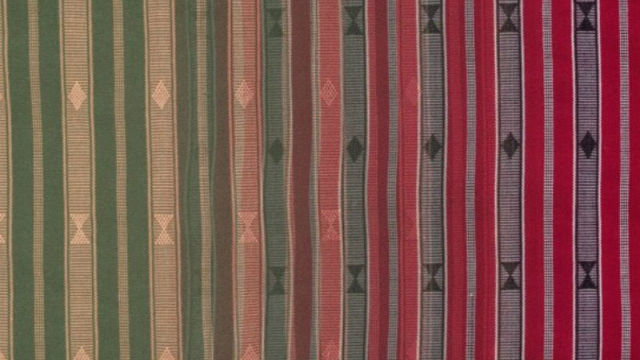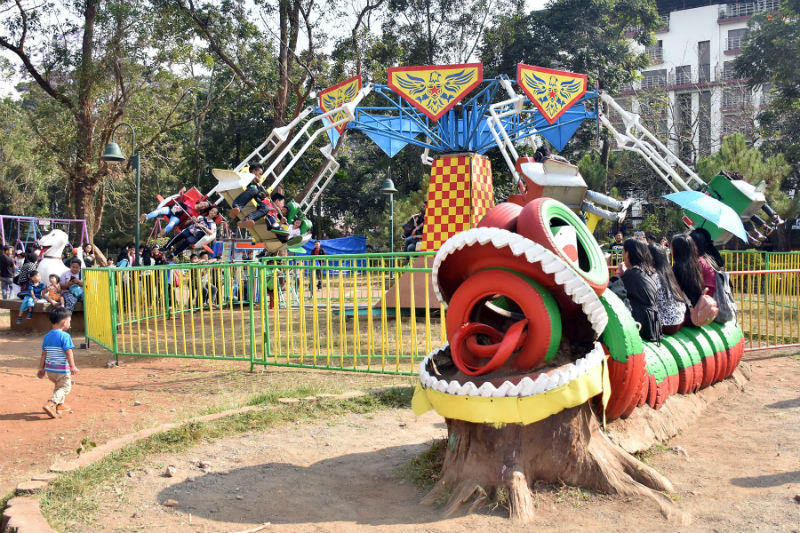Threading its first weaver’s forum, the Cordillera Weavers Producers Cooperative (CWPC) in partnership with Benguet State University (BSU) and line agencies such as Cooperative Development Authority (CDA), and the Department of Tourism (DOT), held the Cordillera 1st Weaver’s Forum on April 12, 2018 at the BSU College of Teacher Education Function Hall.
University President Feliciano G. Calora, Jr. in his welcome remarks said that it is part of BSU’s advocacy contribute to the country’s development through engaging with its partner agencies. He also encouraged the CDA to provide funds for weavers associations to be able to benchmark with other countries.
“I hope that the research component of this is considered primarily because we have to be innovative, we have to use new technologies in developing new weaves that will be world-class and globally acceptable,” Calora said. “Thus I encourage everyone to go out and visit places.”
CDA Administrator Dr. Eulogio T. Castillo then said what he observed in the Cordilleras, that the environment is deteriorating with the intensive focus on tourism. He said that the nature, culture, and business are intertwined. If one is damaged, then the whole connection is lost.
Castillo said that it is a challenge to maintain the connection between the trio as the tourism business is likely the one that would damage the environment and culture. He then said that the community or the local government unit should find an intervention that would retain the connection of the three: thus weaving is introduced.
“This is why we approached [our partner agencies], to develop a plan to promote, expand, conserve, and enhance the competitiveness of the weaving industry in Cordillera,” expressed Castillo.
He added that the industry as he observed is losing its competitiveness in the market as the inroads of modernization approaches adding to it the waning interest and appreciation of the public to the traditional weave.
Castillo encouraged that action is required to address its issues with the forum as the initiative to enhance the weaving industry and discuss each issue concerning it. Partner agencies are implored to contribute to its development from its resources, its process, to the participation of the community.
“We have to harness the cooperative spirit…para magkaroon ng congregations yung mga weavers, and a place to go kung mayroon silang itatanong, gustong gawin, o gustong i-improve: that will serve now as the convergence point of the various interests regarding the weaving [industry],” Castillo said.
After the message Weaver-Representatives and Local Government Units presented the weaving situation and experiences of each LGU and weaver organization.
Cordillera LGUs and Weavers Association Presentation
First presenter is Local Economic and Investment Promotions Officer Camilo B. Alumit representing the Province of Benguet, in which he said that the weaving industry is being left behind. However, the Benguet LGU has institutionalized financial support for small and medium-sized enterprises (SMEs) in which some weaver’s groups are involved.
“Of course we cannot separate the industry of weaving with that of culture,” Alumit said adding that with the School of Living Tradition Program, municipalities in Benguet practice the culture of Benguet with the use of the bedit and the baag (woven garb).
Baguio City Planning Officer Engr. Evelyn Cayat represented City mayor Mauricio Domogan and reported the weaving industry in Baguio City. She said that the Bloom Weaver’s Association of and the Conqueror’s Weaving Association of Quirino Hill, Baguio City was granted finiancial assistance from the City LGU to continue the weaving enterprise.
“Baguio City has become the market outlet of woven products: from the common bonnets and mittens, to the commercial shawl and Filipiniana dresses and barongs, all made by the hands of our intricate weavers,” said Cayat.
Department of Trade and Industry (DTI) Development Specialist Jessie Cris M. Lahboy, who formerly worked with the weaving industry of Ifugao represented its LGU for the presentation. Lahboy said that with the opening of the Nagacadan Trail, Kiangan, Ifugao, tourists with a sense of adventure doubled in number to appreciate Ifugao’s world famous rice terraces and the cultural arts.
“With the experience of the weavers in Ifugao, nakita nila na may pera talaga sa weaving,” Lahboy said adding that Banaue on the other hand is now considering weaving as a main business enterprise for the Ifugao people to tap into.
Florence Amily Ao-wat of the Kinwa Etnika Handicrafts of Tabuk City, Kalinga presented her reports on the weaving industry. She said that the designs are more dynamic and that the Kalinga people are tapping into the integration of the weave designs to modern day garments with elders approving of the development. Ao-wat reported that there are a total of 24 weave designs and their team is still in the process of retrieving the lost designs.
Rose Ann B. Wangdali of the Montañosa Weaver’s Association of Sagada, Mountain Province reported on the weaving industry. She said that tourists always have a knack for the weave, and the business is good for weavers. With the issue of the lack of younger weavers, the association conducted trainings to the younger audience who are interested in weaving.
Judy Kimayong, President of D’Dreamers Association in Baguio City also reported on the products, efforts, and challenges of the association regarding weaving. Nora A. Duculan, President of the Bloom Weaver’s Association also reported on their achievements.
National Government programs on Weaving and inputs from the academe
DTI – Industry Development Division Chief Mimosa B. Regis shared the projects that DTI is contributing to the weaving industry. She said first that there are a lot of issues in the industry that is in need of addressing. She observed that most of the organizations lacks in younger weavers which threaten the sustainability of the industry.
“So that we can be competitive in the world market, we need to create a strong brand. Kaya maganda dito sa Cordillera kasi ‘yung kultura natin ay pwedeng ma-integrate sa ating mga products,” Regis said. “’That’s what sells in the global market… ‘yung bawat produkto po natin ay lalagyan po natin ng kwento.”
Regis focused on four key programs that support the weaving industry: the Negosyo Center, Negosyo Center Trainings, Kapatid Mentor Me (KMMe), and Trade Promotion activities. The Negosyo Center provides access to the rural entrepreneurs to market their products and it provides services and equipments for them; the Negosyo Center trainings on the other hand provides skills and training improvements and innovations to empower potential entrepreneurs; the KMMe program on the other hand is an intensive coaching and mentoring to potential entrepreneurs on starting their own businesses; finally the Trade Promotion activities are aimed at exposing the products to a wider market.
National Economic Development Authority (NEDA) Assistant Regional Director Jedida L. Aquino then discussed the programs under NEDA that supports the weaving industry. Aquino said that NEDA is the policy making entity in terms of development as a whole. She said that in the 2017-2018 Regional Development Plan of NEDA, there is a specific provision for culture and values that speaks of strategies that could support the weavers.
One strategy mentioned is appreciation for the indigenous arts and crafts. As an incitement, Aquino said that Cordillera Autonomy would help boost this strategy into full blown policies for the region.
“We believe that if we are autonomous, we can come up with policies and projects, programs that would be responsive to our unique requirements…maybe the regional government later will provide more support not only financially but also in terms of technology and the rest of the support system that we could give to the weavers,” stressed Aquino.
Another strategy is ensured occupational safety and health in relations to the weaving process where workers in the textile industry are exposed to high contents of cotton dust, high level of noise, and the toxic chemicals obtained from bleaching, dyeing, and finishing processes.
The other strategies mentioned are the integration of indigenous crafts to the formal education system; strengthening documentation of indigenous knowledge, systems, and practices; promote innovations; and sustaining existing efforts towards promotion of trade and arts among others.
Department of Science and Technology (DOST) – CAR Senior Science Research Specialist Pita S. Picpican on the other hand introduced the DOST Technology Business Incubator program in which textile production is taught for prospect enterprise creation. Picpican also said that the sericulture (silk production) is also continuing as they coordinated with Kalinga State University and Ifugao State University to mulberry trees.
Picpican added that DOST have centers that specifically provides trainings, looms, and equipment for weavers in CAR. She reported that there is also a Natural Dye Hub located in Abra that adopts the natural dye technology for the weave threads. She added that DOST is also conducting the ArtisTELA and the Perfect Fit contest where weavers are to present their unique designs as a way to encourage innovations on weaving design.
Dr. Adalyn V. Salvador-Amores, Project Leader of the University of Philippines Baguio Cordillera Textile Project then presented their on-going project titled: “Anthropological Analysis, Mathematical Symmetry, and Technical Characterization of Cordillera Textiles.”
“So that thing was the overriding question for our research, to find out what are the traditional materials, what are the natural dyes that were used, what are the meaning of these traditional patterns that we can preserve and for that to transmit to our local weavers,” said Amores.
Prof. Norma P. Banaña, representative of BSU gave a background on the then weaving project of BSU in the 1950’s with the then course of Bachelor of Science in Home Making until it became only a subject in the 60s. The subject itself was cancelled completely because there was no one to teach weaving.
However, Banaña said that BSU provided trainings and sent interns to weavers association and to the Easter Weaving School in Baguio City. She added that the weaving subject is passed on February and is undergoing board resolution approval.
“I see a very bright future for the weaving industry, so long as we are here… I will not believe that the weaving industry will be having a natural death,” expressed Banaña.
After the discussions an open forum was held with the resolution that the weaving industry in the Cordillera should be strengthened and is in dire need of branding and product patenting to protect its authenticity.
With the success of the 1st Weaver’s forum and the resolve that left the participant’s hearts, it can be proven that the Cordilleran thread does not only end with the heddle’s last click, it looms on.//MDPenchog














